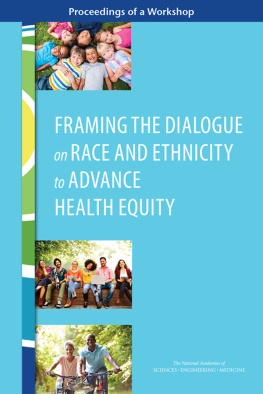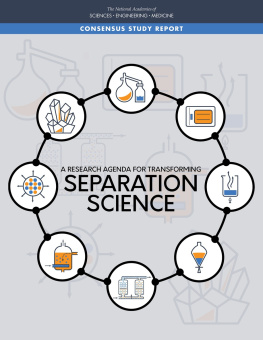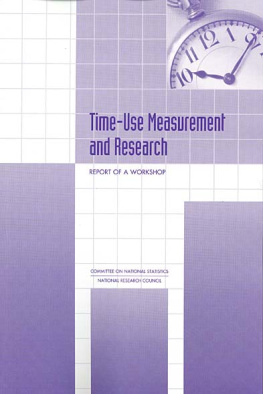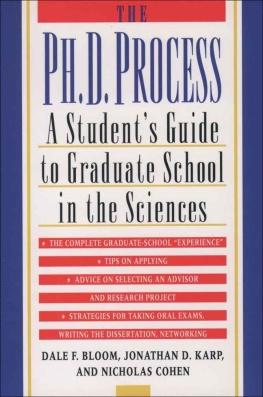Graduate Education in the Chemical Sciences Issues for the 21st Century
REPORT OF A WORKSHOP
Chemical Sciences Roundtable
Board on Chemical Sciences and Technology
Commission on Physical Sciences, Mathematics, and Applications
National Research Council
NATIONAL ACADEMY PRESS
Washington, D.C.
NOTICE: The project that is the subject of this report was approved by the Governing Board of the National Research Council, whose members are drawn from the councils of the National Academy of Sciences, the National Academy of Engineering, and the Institute of Medicine. The members of the workshop organizing committee responsible for the report were chosen for their special competences and with regard for appropriate balance.
Support for this project was provided by the National Science Foundation under Grant No. CHE-9630106, the National Institutes of Health under Contract No. N01-OD-4-2139, and the U.S. Department of Energy under Grant No. DE-FG02-95ER14556. Any opinions, findings, conclusions, or recommendations expressed in this material are those of the authors and do not necessarily reflect the views of the National Science Foundation, the National Institutes of Health, or the U.S. Department of Energy.
ISBN 0-309-17172-5 e-pub ISBN
International Standard Book Number: 0-309-07130-5
Additional copies of this report are available from: National Academy Press
2101 Constitution Avenue, NW Box 285
Washington, DC 20055 800-624-6242 202-334-3313 (in the Washington metropolitan area)
http://www.nap.edu
Board on Chemical Sciences and Technology
NAS 273, National Research Council
2101 Constitution Avenue, NW
Washington, DC 20418
202-334-2156
Copyright 2000 by the National Academy of Sciences. All rights reserved.
Printed in the United States of America
THE NATIONAL ACADEMIES
National Academy of Sciences
National Academy of Engineering
Institute of Medicine
National Research Council
The National Academy of Sciences is a private, nonprofit, self-perpetuating society of distinguished scholars engaged in scientific and engineering research, dedicated to the furtherance of science and technology and to their use for the general welfare. Upon the authority of the charter granted to it by the Congress in 1863, the Academy has a mandate that requires it to advise the federal government on scientific and technical matters. Dr. Bruce M. Alberts is president of the National Academy of Sciences.
The National Academy of Engineering was established in 1964, under the charter of the National Academy of Sciences, as a parallel organization of outstanding engineers. It is autonomous in its administration and in the selection of its members, sharing with the National Academy of Sciences the responsibility for advising the federal government. The National Academy of Engineering also sponsors engineering programs aimed at meeting national needs, encourages education and research, and recognizes the superior achievements of engineers. Dr. William A. Wulf is president of the National Academy of Engineering.
The Institute of Medicine was established in 1970 by the National Academy of Sciences to secure the services of eminent members of appropriate professions in the examination of policy matters pertaining to the health of the public. The Institute acts under the responsibility given to the National Academy of Sciences by its congressional charter to be an adviser to the federal government and, upon its own initiative, to identify issues of medical care, research, and education. Dr. Kenneth I. Shine is president of the Institute of Medicine.
The National Research Council was organized by the National Academy of Sciences in 1916 to associate the broad community of science and technology with the Academys purposes of furthering knowledge and advising the federal government. Functioning in accordance with general policies determined by the Academy, the Council has become the principal operating agency of both the National Academy of Sciences and the National Academy of Engineering in providing services to the government, the public, and the scientific and engineering communities. The Council is administered jointly by both Academies and the Institute of Medicine. Dr. Bruce M. Alberts and Dr. William A. Wulf are chairman and vice chairman, respectively, of the National Research Council.
CHEMICAL SCIENCES ROUNDTABLE
RICHARD C. ALKIRE,
University of Illinois at Urbana-Champaign,
Chair
MARION C. THURNAUER,
Argonne National Laboratory,
Vice Chair
ALEXIS T. BELL,
University of California, Berkeley
DARYLE H. BUSCH,
University of Kansas
MARCETTA Y. DARENSBOURG,
Texas A&M University
MICHAEL P. DOYLE,
Research Corporation
BRUCE A. FINLAYSON,
University of Washington
RICHARD M. GROSS,
The Dow Chemical Company
ESIN GULARI,
Wayne State University
L. LOUIS HEGEDUS,
Elf Atochem North America, Inc.
ANDREW KALDOR,
Exxon Mobil Corporation
FLINT LEWIS,
American Chemical Society
ROBERT L. LICHTER,
The Camille & Henry Dreyfus Foundation, Inc.
MARY L. MANDICH,
Bell Laboratories, Lucent Technologies
ROBERT S. MARIANELLI,
Office of Science and Technology Policy
TOBIN J. MARKS,
Northwestern University
JOE J. MAYHEW,
Chemical Manufacturers Association
WILLIAM S. MILLMAN,
U.S. Department of Energy
KAREN W. MORSE,
Western Washington University
NORINE E. NOONAN,
U.S. Environmental Protection Agency
JANET G. OSTERYOUNG,
National Science Foundation
NANCY PARENTEAU,
Organogenesis, Inc.
GARY W. POEHLEIN,
National Science Foundation
MICHAEL E. ROGERS,
National Institute of General Medical Sciences
HRATCH G. SEMERJIAN,
National Institute of Standards and Technology
PETER J. STANG,
University of Utah
D. AMY TRAINOR,
Zeneca Pharmaceuticals
JEANETTE M. VAN EMON,
U.S. Environmental Protection Agency National Exposure Research Laboratory
ISIAH M. WARNER,
Louisiana State University
Staff
DOUGLAS J. RABER, Director,
Board on Chemical Sciences and Technology
SYBIL A. PAIGE, Administrative Associate
RUTH MCDIARMID, Senior Program Officer
SUSAN R. MORRISSEY, National Research Council Intern
BOARD ON CHEMICAL SCIENCES AND TECHNOLOGY
LARRY E. OVERMAN,
University of California, Irvine,
Co-chair
JOHN L. ANDERSON,
Carnegie Mellon University,
Co-chair
BARBARA J. GARRISON,
Pennsylvania State University
ALICE P. GAST,
Stanford University
LOUIS C. GLASGOW,
E.I. du Pont de Nemours & Company
KEITH E. GUBBINS,
North Carolina State University
NANCY B. JACKSON,
Sandia National Laboratories
JIRI JONAS,
University of Illinois at Urbana-Champaign
GEORGE E. KELLER,
Union Carbide Corporation (retired)
RICHARD A. LERNER,
Scripps Research Institute
GREGORY A. PETSKO,
Brandeis University
WAYNE H. PITCHER, JR.,
Genencor Corporation
KENNETH N. RAYMOND,
University of California, Berkeley
PAUL J. REIDER,
Merck Research Laboratories
LYNN F. SCHNEEMEYER,
Bell Laboratories, Lucent Technologies
MARTIN B. SHERWIN,
ChemVen Group, Inc.
JEFFREY J. SIIROLA,
Eastman Chemical Company






